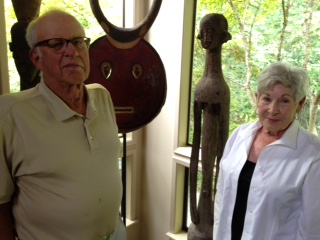Dr. Oliver E. and Pamela J. Cobb
In summer 2007, Dr. Oliver (Ollie) Cobb, a retired Seattle physician, approached PLU expressing the wish to give the university a piece of African art <grave post from the Bongo people of Sudan> (Accession no. 2007.02.001) in memory of the Lehmanns, who had been friends and fellow collectors, and who had given a number of pieces to PLU. Not knowing much about African art, the (then-)Development Office reached out to Prof. Neal Sobania, a historian of Africa on faculty who has museum-exhibition experience, to accompany staff to the Cobbs’ home to accept the piece. During that visit, after a lengthy conversation about PLU and African art, Dr. Cobb also gave PLU a beauty-parlor sign from Ghana (this is now framed and can be seen in the Center for Diversity, Justice, and Sustainability, located in the Anderson University Center). Dr. Cobb also indicated he would speak with his wife about one or two additional pieces they might also give to PLU.
In October 2007, Dr. Cobb came to the PLU campus and brought with him two more pieces as gifts to PLU; a <Makonde helmet mask> (Accession no. 2007.02.002) and a <Bete mask> (Accession no. 2007.02.003). At a subsequent campus event, the Cobbs were invited and recognized for their gifts of artwork. Impressed by the student presentations that were part of the occasion, they came away with a strong sense of PLU’s commitment to student learning. The following June, they suggested a return visit to their home with the instruction, “Bring the van.” On the first visit, a van was used to transport the 68-inch-long grave post; this time it was needed to transport the nine additional pieces of African art the Cobbs were giving to PLU. Each subsequent year, through 2011, the Cobbs continued to give additional pieces of African art to PLU, for a total of 32, plus the beauty-parlor sign, and continue to be interested in donating more.

As to how he became a collector, Dr. Cobb explains that an appreciation of tribal art was in his family beginning with his grandfather, and as an undergraduate at Williams College he had taken courses in art history. When he moved to the Northwest in 1965, his desire was to collect Northwest Coast art, but the difference in what a Northwest piece cost and an African mask or figure was truly significant. And with his mother living in New York City across from Parke-Bernet auction house, Dr. Cobb would peruse auction catalogs and his mother would bid on possible acquisitions. When he and Pam married, she said she knew nothing about African art. However, as they visited dealers and auction houses in New York and Europe, especially London and Paris, and traveled to Mali, Burkina Faso and Cote d’Ivoire, Pam’s knowledge greatly increased. “How can it not when you see objects up-close, hold them in your hands, study them, and meet and learn from other collectors?” she asked. The pieces they buy are ones they like; “we don’t buy anything we don’t like.”
“We bought them with love, and we release them with love” the Cobbs responded when asked why they donate pieces from their collection to museums. As to the outcome of these gifts, their desire is that “they’re seen. That students have access to them, can touch them, hold them, study them….what’s nice about African art is it’s sturdy; you can hold them [African art objects] and not harm them.”
Today the Cobbs occasionally still buy a piece. As other serious collectors understand, the excitement of pursuing a piece is still there, and the “last piece you buy receives your most immediate attention.”
(Includes Personal Communication, Oliver and Pamela Cobb, June 24, 2015.)


